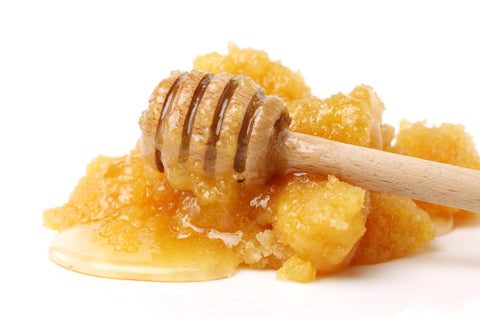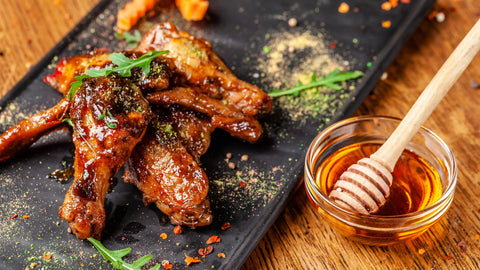Honey represents one of the oldest and most effective natural supplements for athletes, used for millennia to support physical performance and accelerate recovery. Unlike synthetic carbohydrates and industrial energy drinks, honey offers a complex nutritional profile that makes it the perfect ally for those who practice sports at all levels.
The Science of Honey in Sports: Why It Works
Unique Nutritional Composition
Honey is not simply sugar: it's a concentrate of natural energy with a complex composition that makes it ideal for sports nutrition:
Carbohydrates (75-80%):
-
Glucose (30-35%): immediate energy, rapid absorption
-
Fructose (35-40%): sustained energy release, lower glycemic impact
-
Maltose and other sugars (5-10%): gradual energy support
Essential micronutrients:
-
B-group vitamins: support for energy metabolism
-
Vitamin C: antioxidant action and immune support
-
Minerals (potassium, magnesium, calcium): electrolyte balance
-
Natural enzymes: optimized digestion and facilitated absorption
The Mixed Glycemic Index Advantage
Unlike sucrose or pure glucose, honey presents a variable glycemic index (from 35 to 85 depending on variety) that offers a dual advantage:
-
Immediate energy from glucose for instant performance
-
Sustained energy from fructose for prolonged endurance
This unique profile avoids glycemic spikes followed by sudden energy drops typical of simple sugars.
Advantages of Honey vs Other Sweeteners for Athletes
Honey vs Commercial Energy Gels
Honey advantages:
-
Natural composition without chemical additives
-
Better gastric tolerability during exercise
-
Significantly lower cost
-
Gradual absorption that avoids digestive overload
-
Antibacterial properties that support intestinal health
Disadvantages of synthetic gels:
-
Possible gastrointestinal disturbances
-
Dependence on caffeine and artificial stimulants
-
High cost for continuous use
-
Artificial flavors that can be unpleasant
Honey vs Industrial Sports Drinks
Honey advantages:
-
Absence of artificial colors and preservatives
-
Natural electrolytes instead of added sodium
-
Prebiotic action that supports intestinal flora
-
Versatility in homemade preparations
Problems with commercial drinks:
-
High sodium content that can cause water retention
-
Synthetic sugars that can alter intestinal microbiota
-
Environmental impact of industrial packaging
Honey vs White Sugar/Dextrose
Honey advantages:
-
More controlled and lasting energy release
-
Presence of antioxidants that counteract oxidative stress
-
Enzymes that facilitate digestion
-
Minerals that support muscle function
Optimal Timing: When and How to Use Honey
Pre-Workout (30-60 minutes before)
Objective: Maximize glycogen reserves and ensure immediate energy
Recommended dosage: 20-30g of honey (1-2 tablespoons)
Ideal varieties:
-
Acacia honey: gradual absorption, doesn't weigh down
-
Wildflower honey: balanced and stable energy
Pre-Workout Energizing Recipe:
-
2 tablespoons acacia honey
-
10 fl oz (300ml) warm water
-
Juice of ½ lemon
-
Pinch of sea salt
-
1 teaspoon fresh grated ginger
Consumption method: Dissolve honey in slightly warm water to facilitate absorption. Consume slowly over 15 minutes to avoid digestive overload.
During Workout (every 45-60 minutes)
Objective: Maintain stable energy levels and prevent hypoglycemia
Recommended dosage: 15-20g of honey every hour of intense activity
Ideal varieties:
-
Sunflower honey: rapid absorption, fine crystallization
-
Sulla honey: delicate sweetness, doesn't disturb the stomach
Homemade Natural Energy Gel:
-
3 tablespoons sunflower honey
-
1 tablespoon lemon juice
-
Pinch of sea salt
-
1 teaspoon coconut oil (optional for ultra-endurance sports)
Consumption tips:
-
Dilute slightly with water to facilitate swallowing
-
Take small frequent amounts rather than massive doses
-
Always accompany with water to maintain hydration
Post-Workout (within 30 minutes)
Objective: Rapid restoration of muscle and liver glycogen
Recommended dosage: 30-50g of honey combined with proteins
Ideal varieties:
-
Chestnut honey: rich in minerals for recovery
Complete Recovery Shake:
-
3 tablespoons chestnut honey
-
8.5 fl oz (250ml) almond milk or skim milk
-
1 ripe banana
-
1 tablespoon almond butter
-
1 teaspoon cinnamon
-
Ice as desired
Critical timing: The 30-minute post-workout "anabolic window" is crucial for recovery. Honey provides the carbohydrates needed to stimulate insulin and promote nutrient uptake in muscles.
Recipes for Natural Energy Drinks
Energy Drink for Endurance (Cycling, Running, Swimming)
Ingredients:
-
4 tablespoons wildflower honey
-
17 fl oz (500ml) water
-
Juice of 1 whole lemon
-
¼ teaspoon sea salt
-
2 tablespoons orange juice
-
1 pinch baking soda
Preparation:
-
Slightly warm the water (not boiling)
-
Completely dissolve the honey
-
Add all other ingredients
-
Mix well and let cool
-
Store in refrigerator for maximum 24 hours
Usage: 5-7 fl oz (150-200ml) every 20-30 minutes during prolonged activities
Electrolyte Drink for Intense Sports
Ingredients:
-
3 tablespoons acacia honey
-
13.5 fl oz (400ml) natural coconut water
-
3.5 fl oz (100ml) pink grapefruit juice
-
½ teaspoon Himalayan salt
-
1 tablespoon apple cider vinegar
-
Fresh mint leaves
Preparation:
-
Mix honey and coconut water until completely dissolved
-
Add grapefruit juice and apple cider vinegar
-
Incorporate salt and mix well
-
Add mint and let infuse for 30 minutes
-
Strain and store cool
Benefits: Optimal electrolyte restoration, hydration support, alkalizing action
Post-Workout Recovery Drink
Ingredients:
-
3 tablespoons chestnut honey
-
7 fl oz (200ml) skim milk or plant protein drink
-
1 tablespoon unsweetened cocoa powder
-
½ ripe avocado
-
1 tablespoon natural peanut butter
-
Ice
Preparation:
-
Blend all ingredients until creamy consistency
-
Add ice for desired temperature
-
Consume within 30 minutes of workout completion
Nutritional ratio: 3:1 carbohydrates/proteins, ideal for muscle recovery
Sport-Specific Protocols
Endurance Sports (Cycling, Running, Triathlon)
Pre-race (2-3 hours before):
-
40-50g honey with oat porridge
-
Combination with complex carbohydrates for sustained energy
During competition:
-
20-30g honey every 60-90 minutes
-
1:4 dilution with water for optimal absorption
-
Alternation with saline sources for electrolyte balance
Post-race:
-
30g honey + 20g proteins within 30 minutes
-
Ideal combination for muscle recovery
Explosive Sports (Sprint, Weightlifting, Team Sports)
Pre-workout:
-
15-20g honey 30-45 minutes before
-
Prefer high glycemic index varieties (sunflower, wildflower)
Intra-workout:
-
Only for sessions longer than 90 minutes
-
10-15g every hour of intense activity
Post-workout:
-
25-30g honey immediately after
-
Combination with whey proteins for protein synthesis
Technical Sports (Tennis, Fencing, Martial Arts)
Energy strategy:
-
Small frequent doses (5-10g every 30 minutes)
-
Focus on varieties that don't weigh down (acacia, sulla)
-
Attention to constant hydration
Scientific Considerations and Dosages
Scientific Research on Honey in Sports
University of Memphis Study (2004): Comparison between honey, dextrose, and placebo in cyclists during 40-mile (64km) performance. Results: honey showed significantly better times compared to placebo and equivalent performance to dextrose, but with better gastric tolerability.
University of Stellenbosch Research (2007): Study on runners during marathon. The honey group showed:
-
More stable blood glucose maintenance
-
Reduction of post-race inflammatory markers
-
Better hydration during performance
Precautions and Contraindications
When to Pay Attention
-
Diabetes: Always consult doctor before use
-
Pollen allergies: Start with small quantities to test tolerance
-
Gastrointestinal problems: Prefer delicate varieties like acacia
Common Mistakes to Avoid
-
Overdosing: Don't exceed 30g per hour during activity
-
Empty stomach consumption: Always accompany with water
-
Too concentrated honey: Always dilute during exercise
-
Wrong timing: Respect intake timing
Honey represents a natural revolution in modern sports nutrition. Its unique composition, effectiveness proven by centuries of use, and support from contemporary scientific research make it the ideal supplement for athletes of every level and discipline.
Choosing honey means opting for a sustainable and natural approach to sports performance, abandoning dependence on synthetic products that are often expensive and potentially harmful to long-term health.
In our store you'll find a selection of artisanal honeys specifically chosen for their energetic properties and purity that makes them perfect for sports nutrition. Each variety has been tested and selected to guarantee athletes maximum benefit from their performance.
Discover the natural power of honey and transform your sports nutrition with the purest energy that nature can offer. Your body and your performance will thank you.



